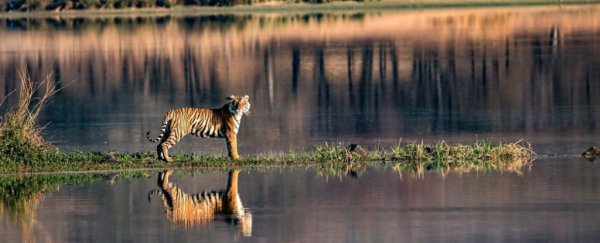Sir David Attenborough is much beloved as a broadcaster and naturalist, but a recent interview about his new BBC documentary series has stirred up some heated discussions in the environmental community.
Ahead of the latest five-part nature series called Dynasties, Attenborough was interviewed by Jonathan Watts at the Observer (a UK Sunday newspaper and sister publication to The Guardian) about his thoughts on how we talk about saving the planet.
And his comments warned against alarmism, arguing that talking about drastic environmental problems too often could be counterproductive.
"We do have a problem. Every time the bell rings, every time that image [of a threatened animal] comes up, do you say 'remember, they are in danger'? How often do you say this without becoming a real turn-off?" he explains to The Observer.
"It would be irresponsible to ignore it, but equally I believe we have a responsibility to make programmes that look at all the rest of the aspects and not just this one."
As Watts explains, although the BBC series does touch on the high levels of wildlife extinction, it doesn't blame the viewers themselves.
This approach is similar to other series done in the past, such as Planet Earth and Planet Earth II, which have also been criticised for not making education a bigger priority.
"We all have responsibilities as citizens but our primary job is to make a series that is gripping and truthful, and talks about something important – and to tell it in its round fullness," said Attenborough.
"These are not ecological programmes. They are not proselytising programmes. They are not alarmist programmes. What they are is a new form of wildlife filmmaking."
It's brought to the surface many tensions people have about the use of environmental and nature programming - many don't just want it to entertain, but also to educate.
Journalist George Monbiot posted a scathing response on Twitter, saying that he was frustrated with Sir David's comments.
I find this intensely frustrating. For decades, Attenborough has created a false impression of the health of the living world, and repeatedly *failed* to highlight the realities. Now he makes a doctrine of this failure. pic.twitter.com/MbyWSwNKYa
— George Monbiot (@GeorgeMonbiot) November 4, 2018
I started my career, in 1985, at the BBC Natural History Unit, then, for the following 30 years, have tried to persuade the BBC, Attenborough included, to portray environmental realities. It has been immensely frustrating. Good broadcasters can do it without turning people off.
— George Monbiot (@GeorgeMonbiot) November 4, 2018
Other writers and environmentalists agreed that we needed to take more of a stand:
Have to say, not sure I agree with Sir Dave there. Handful of mentions for plastic on Blue Planet 2 had such a galvanising effect on that issue. Imagine if his series had been doing the same on other pressing environmental topics ever since the 1950s... https://t.co/WlMZP0JC4v
— Tom Jennings (@tomjennings) November 4, 2018
But there were also others who agreed with Attenborough that we need a more measured approach if we're going to get people on board the cause of environmental protection (although we're guessing it's not measured in emoji use).
While there is definitely cause for alarmism, conservation is inspired in the wonder and joy of nature. There’s a place for both - #Attenborough knows what he’s doing 🦍🦓🐆🐼🎋🌲🌱🦇🐛🦋🌺🌻🐙🦈🐟🦀🦑🌴💫🌏 https://t.co/3AdKv5AMqn
— Kate Jean (@k_jean_) November 4, 2018
To Attenborough, the idea is to bring people in by letting them understand the wonder of nature.
"If they appreciate the wonder, then they care about it, and that's when it brings you to your other mission – which is to make people interested, then more likely to care and conserve, and become active in saving the planet," he told the Observer.
But it's understandable why such a soft approach would leave many frustrated with what seems to be a global lack of action.
Just in the last few weeks we've had reports that we've lost 60 percent of vertebrate wildlife in the last 40 years, the Chinese government will soon legalise the use of rhino horn and tiger bone after a 25 year ban, and we're losing huge numbers of invertebrate populations, too.
It's rough out there.
While the BBC nature documentaries are stunning, they can also serve as a hugely impactful platform for communicating the pressing issues our planet is facing today; every time Sir Attenborough makes a direct plea for people to take care of their planet, he reaches millions of people, and especially the younger generations.
It would be heartbreaking if his documentaries ended up to be the only means for future generations to experience the diversity of Earth's wildlife.
